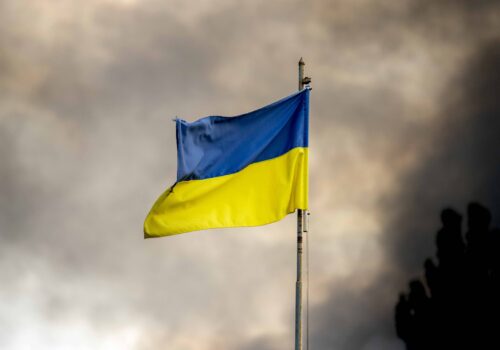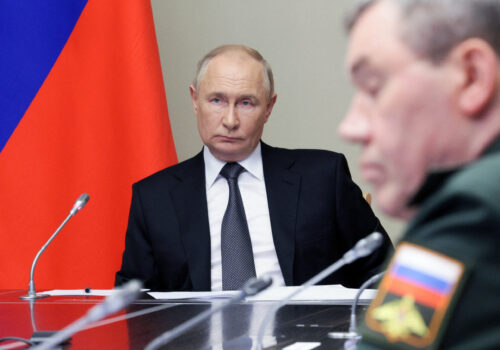Ukrainian President Volodymyr Zelenskyy presided over his government’s largest wartime reshuffle in early September, with nine ministries getting new permanent leadership. As the news filtered into Western capitals, media and experts alike scrambled to make sense of the changes. Back in Kyiv, many lawmakers and analysts appeared relatively unmoved by the announcements, in contrast to the cheers and jeers that have come with previous shifts in Zelenskyy’s government.
Perhaps the most notable figure to resign was Ukrainian Foreign Minister Dmytro Kuleba, who had been a steady, passionate voice as Ukraine’s top diplomat for the last four years. Deputy Prime Minister for European Integration Olha Stefanishyna, another longtime minister, resigned from her post only to be quickly named as the new Justice Minister, replacing Denys Maliuska.
Oleksandr Kamyshin’s swift rise in government looks set to continue as he takes up a post as presidential advisor for strategic issues after resigning as Minister of Strategic Industries. He joins former Deputy Prime Minister for the Reintegration of Occupied Territories Iryna Vereshchuk, who will be a new deputy in the Office of the President.
Stay updated
As the world watches the Russian invasion of Ukraine unfold, UkraineAlert delivers the best Atlantic Council expert insight and analysis on Ukraine twice a week directly to your inbox.
The somewhat muted reaction in Ukraine to such a significant government shakeup reflects a number of factors. First, none of the cabinet changes came in the wake of a scandal or amid whispers of corruption. They appear to be purely a shift in personnel.
Second, Zelenskyy had long telegraphed plans for a major government shakeup. Speaking to Italian media in February 2024, he said “a reset” was necessary. “I have something serious in mind, which is not about a single person but about the direction of the country’s leadership,” he commented. At the time, observers fixated on the “single person” reference, assuming he was talking about Ukraine’s highly regarded military commander Valeriy Zaluzhny, who was subsequently removed and appointed Ukrainian ambassador to Great Britain.
Crucially, none of the changes in the recent reshuffle directly involve the military or the economy. Replacing the minister of defense or economy would have set off alarm bells among Ukraine’s Western partners, but those positions look stable. The closest person to the battlefield was Kamyshin, who leaves Ukraine’s Ministry of Strategic Industries with a revamped and highly effective drone program in place.
The new blood leading these ministries is not all that new, either. Instead, Zelenskyy appears to be promoting trusted cadres, assigning others new or enhanced portfolios, offering acting ministers permanent gigs, and, in the case of former foreign minister Dmytro Kuleba, giving some a deserved break after years of strenuous work.
Publicly at least, Ukraine’s Western partners took the personnel changes in stride. US Secretary of State Antony Blinken and many other foreign ministers thanked Kuleba for his work and dedication. The European Union offered a suitably bland reaction, calling the shakeup Ukraine’s “internal matter” and expressing hopes to “continue very good cooperation” with Kyiv.
Eurasia Center events

The two most interesting newcomers are new Ukrainian Foreign Minister Andriy Sybiha and Oleksiy Kuleba, the incoming Deputy Prime Minister for Restoration of Ukraine and Minister for Communities and Territories Development.
Sybiha moves from the Office of the President back to the Ministry of Foreign Affairs, where he has spent much of his government career. He previously served as Ukraine’s ambassador to Türkiye and at the Ukrainian Embassy in Poland, both senior diplomatic posts working with two of Ukraine’s most important neighbors. Zelenskyy will be hoping Sybiha’s experience and strong relationship with presidential chief of staff Andriy Yermak make him an efficient liaison between Kyiv and its many partners.
Kuleba takes over a large ministry formed by the merger of the Ministry for the Reintegration of Occupied Territories and the Ministry of Community Development, Territories, and Infrastructure, which had been led by Oleksandr Kubrakov until his dismissal in May. Some outlets reported that Kuleba’s ministry will soon be split in two, with one ministry set to focus on reconstruction and development, while the other concentrates on infrastructure. That may be a sensible move ahead of what could be another harsh winter of Russian assaults on Ukraine’s civilian energy infrastructure. Kuleba’s previous job was head of regional policy in the Office of the President, working closely with Yermak.
The most controversial personnel decision to emerge from the recent flurry of changes in Kyiv was the firing of Ukrenergo CEO Volodymyr Kudrytskyi. He is widely credited with having worked miracles as head of Ukraine’s state-owned electrical grid operator, most significantly leading the country’s disconnection from the Russian grid in February 2022, months ahead of schedule. Kudrytskyi was seen as a real reformer in Western capitals, leading to significant alarm over his dismissal. Two members of Ukrenergo’s supervisory board resigned in protest, calling Kudrytskyi’s firing “politically motivated.”
Overall, Zelenskyy appears to be shuffling the deck rather than choosing a new set of cards. It is unlikely the nine new ministers will produce dramatic changes in government policy, but they may offer new impetus as Ukraine heads toward its third winter of full-scale war. Kyiv’s whole-of-government approach to the country’s defense has been largely effective so far; Zelenskyy may be betting these tweaks will maintain Ukraine’s edge.
Andrew D’Anieri is a resident fellow at the Atlantic Council’s Eurasia Center.
Further reading

UkraineAlert
Sep 5, 2024
Too many still view Ukraine through the prism of Russian imperialism
By
Olesya Khromeychuk
Far too many Western newspaper editors, academics, and cultural commentators continue to view Ukraine through the distorting lens of Russian imperialism, writes Olesya Khromeychuk.

UkraineAlert
Sep 1, 2024
Key Ukrainian front line city evacuates as Russian offensive gains pace
By
Maria Avdeeva
Evacuation efforts are accelerating in Pokrovsk as Russian troops draw closer amid fears the city will soon become the latest in a growing list of Ukrainian urban centers reduced to rubble by Putin’s invading army, writes Maria Avdeeva.

UkraineAlert
Aug 21, 2024
Invasion? What invasion? Putin is downplaying Ukraine’s Kursk offensive
By
Peter Dickinson
Vladimir Putin’s efforts to downplay Ukraine’s invasion of Russia have severely dented his strongman image and make a mockery of the West’s escalation fears, writes Peter Dickinson.
The views expressed in UkraineAlert are solely those of the authors and do not necessarily reflect the views of the Atlantic Council, its staff, or its supporters.

The Eurasia Center’s mission is to enhance transatlantic cooperation in promoting stability, democratic values and prosperity in Eurasia, from Eastern Europe and Turkey in the West to the Caucasus, Russia and Central Asia in the East.
Follow us on social media
and support our work
The post Ukraine’s biggest wartime government shakeup prompts muted reaction in Kyiv appeared first on Atlantic Council.

